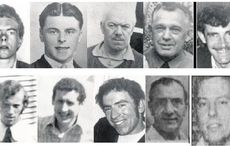In 1989, with no work and no hope of it, I left Ireland. I was a bit of a cliché, a well-educated twenty-something Irish immigrant who had over-stayed her welcome in America and found a job in a bar. With my broad Antrim accent and the right amount of naiveté about Arizona, I was the main source of entertainment for the men who had just come off the day-shift. I charmed them with what they considered an Irish brogue, and the more alcohol I served up, the more they wanted to tell me all about their Irish roots.
This was before micro-breweries were de rigueur. Still, I was overwhelmed by the variety of beer in its variously colored cans. To help me out, the regulars indulged me, “Hey Irish,” they’d beckon and then order rounds by color: “Gimme three silver bullets, a red and blue, two white and blue, and two yellow.”
Around 3:30 every day, the man I eventually married and the others gathered around what I considered "cynics corner" at the end of the bar. We would have fit in handily on the cast of “Cheers.” Ken always arrived first to find his beer waiting for him - white and blue. Then I would position myself behind the bar, right across from him and nonchalantly wrap silver-ware in paper napkins, exchanging quips and innuendoes without making eye-contact, because when I did, I blushed.
No, Ken wasn't the fictional Sam Malone, Cheers bar-owner erstwhile recovering alcoholic and former Red Sox player with a little black book full of women’s names and numbers. Ken didn’t need a team of writers, and I never met a woman who wasn't charmed by him. I wasn’t Diane Chambers (well, maybe just a little) but the chemistry between us was undeniable and more than made up for the lack of compatibility. I know that now more than ever.
But in the mornings, the bar was quiet, with only a few customers coming in after they'd worked the grave-yard shift. One of them was Cliff. He was tall and handsome with a million dollar smile, and Cliff was black. Like the other regulars, he teased me about my accent, about Ken (everyone did), and he asked me endless questions about Ireland, if it was really that green over there and how could it be that a nice girl like me with a college education was working in a dump like this.
One morning, Cliff came in as I was getting a hasty tutorial from the bartender on how to make cocktails. She had decided it was high time I graduated from serving beer in colored cans to making mixed drinks, so by 10 o'clock that morning, there was a long row of dubious cocktails waiting for anyone interested. These were drinks I had never heard of before, given my origins in a country where as long as the pub had Guinness, Powers for a hot whiskey and Hendricks for a gin and tonic, I was grand. But that morning I was deep in a learning curve, familiarizing myself with popular highball cocktails that every bartender should know and then the lowball cocktails favored by some of the locals, like the Mudslide which Bobby, on a Friday night, ordered for everyone in the bar. There were never enough shot-glasses.
Rather than serving up his regular bourbon, I thought Cliff might like to try out some of my creations. "So, what's your pleasure?" I asked. "Perhaps a Tequila Sunrise or a Salty Dog or even a Long Island Iced Tea will sort you out for the rest of the day." I don't remember what he chose, but he thought it was very funny that I had written down all the recipes and that I was planning to learn them all "by heart," the way you would a catechism. While Cliff drank one of my concoctions, we chatted about nothing important - how hot it was already that summer morning, what my plans were for the weekend, that kind of thing.
I hadn't turned on the jukebox, so the only sounds were coming from the kitchen, a dropped fork, a "Godammit" when the owner realized he was missing some ingredient vital to the daily lunch special or that the cook had spiked the coffee with Baileys again. The other bartender was in the office well out of earshot, and at the other end of the bar, there were two men sharing a pitcher of Budweiser. They weren't talking to each other, just staring ahead and smoking.
Chopping limes and slicing lemons, I chatted to Cliff. I remember laughing at something he had said. Then one of those men called out to the owner who was still out of sight, "Since when do you allow the help to talk to niggers?"
Once again, "I said, since when do you allow the help to talk to niggers?"
And I froze.
I felt fear. I felt the kind of fear I used to feel when I saw those black and white newspaper pictures of a young Catholic woman in Belfast who had been stripped and tied to a lamp-post, hot tar and feathers poured on her roughly shorn head because she had committed the crime of falling in love with a British solider. In ”Punishment,” harrowing and haunting to read, Seamus Heaney evokes a young woman who has been shorn, stripped, and killed. A primitive, barbaric act which he juxtaposes with the ‘tarring and feathering’ in the Northern Ireland of his day. The speaker in Heaney’s poem says to the dead woman,
“My poor scapegoat, I almost love you, but would have cast, I know the stones of silence.”
I took a powerful lesson away from this poem, which I have applied to all manner of situations in my life, but I did not apply it that morning in the bar.
I couldn't breathe and I couldn’t speak.
As naive as this sounds now - especially following the day when a Grand Jury cleared a white police officer in the choke-hold death of an unarmed black man, Eric Garner; in the weeks following the day when a Grand Jury decided there would be no indictment of the police officer who killed an unarmed black teenager, Michael Brown, in Ferguson - I had thought, in 1980s America, that racism had been eradicated.
I thought such a thing because in 1977, my parents and I - along with everyone else we knew – had gathered around our little television every Sunday night to watch “Roots,” horrified as Kunta Kinte was sold into slavery in America and whipped within an inch of his life for trying to escape. Night by night, we watched, our hearts broken. I suppose I believed that just as the entire country seemed to be galvanized by the story unfolding on Roots, that an entire country would subsequently adopt a kinder, gentler attitude, but it didn't, did it?
Of Roots, James Baldwin once wrote: “Roots" is a study of continuities, of consequences, of how a people perpetuate themselves, how each generation helps to doom, or helps to liberate, the coming one--the action of love, or the effect of the absence of love, in time. It suggests, with great power, how each of us, however unconsciously, can't but be the vehicle of the history which has produced us. Well, we can perish in this vehicle, children, or we can move on up the road.”
That morning in a little bar in Phoenix, Arizona, I couldn't have been further away from Gambia, West Africa in 1750, Kunta Kinte's place of birth. And still, I said nothing to those two men. To Cliff, I said, "I'm sorry," but I said it quietly, too quietly.
Cliff said nothing to me, but he looked at me and his eyes, I saw not anger, just a resignation, a look that said, clearly, that he was "used to it." With those elegant fingers, he picked up his hat, put it on his head, stood up, and he walked out the door. He left a $20 tip.
I never saw him again.
I am so sorry.




Comments